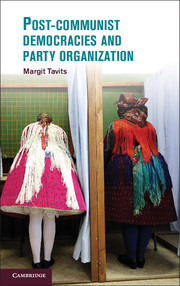Description
Post-Communist Democracies and Party Organization
Author: Tavits Margit
Margit Tavits demonstrates that the successful establishment of a political party in a new democracy crucially depends on the strength of its organization.
Language: English
Subject for Post-Communist Democracies and Party Organization:
Approximative price 32.87 €
In Print (Delivery period: 14 days).
Add to cart
Post-Communist Democracies and Party Organization
Publication date: 06-2013
295 p. · 15.2x22.8 cm · Paperback
Publication date: 06-2013
295 p. · 15.2x22.8 cm · Paperback
Approximative price 77.68 €
In Print (Delivery period: 14 days).
Add to cart
Post-Communist Democracies and Party Organization
Publication date: 06-2013
295 p. · 15.7x23.5 cm · Hardback
Publication date: 06-2013
295 p. · 15.7x23.5 cm · Hardback
Description
/li>Contents
/li>Biography
/li>
Scholars of post-communist politics often argue that parties in new democracies lack strong organizations - sizable membership, local presence, and professional management - because they do not need them to win elections and they may hinder a party's flexibility and efficiency in office. Post-Communist Democracies and Party Organization explains why some political parties are better able than others to establish themselves in new democracies and why some excel at staying unified in parliament, whereas others remain dominated by individuals. Focusing on the democratic transitions in post-communist Europe from 1990 to 2010, Margit Tavits demonstrates that the successful establishment of a political party in a new democracy crucially depends on the strength of its organization. Yet not all parties invest in organization development. This book uses data from ten post-communist democracies, including detailed analysis of parties in the Czech Republic, Estonia, Hungary, and Poland.
1. Introduction; 2. Organizing for success: party organization and party performance; 3. Organizations at work: assessing the causal mechanisms; 4. Organizing for unity: organizational strength and parties in parliament; 5. Power within parties: the consequences of sub-unit organizational strength; 6. Environment, ideology, and leaders: why do some parties have strong and others weak organizations?; 7. Conclusion; Appendixes; References.
Margit Tavits is an Associate Professor of Political Science at Washington University, St Louis. She is the author of Presidents with Prime Ministers: Do Direct Elections Matter? (2009).
© 2024 LAVOISIER S.A.S.




